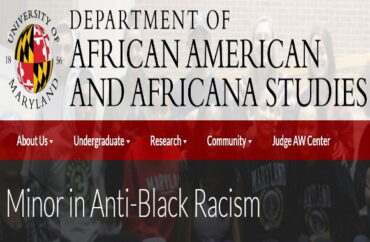
The University of Maryland has 10 students currently minoring in its new anti-Black racism program after officials announced its creation early last year.
Now Maryland’s flagship public university, which has an undergraduate enrollment of 30,000 students, plans to continue offering the minor indefinitely.
“I can share with you that there are 10 students participating in the minor in Anti-Black Racism,” UMD College of Behavioral and Social Sciences communications Director Linda Ours told The College Fix via email.
Ours confirmed UMD would continue to offer the minor indefinitely.
“The minor will continue to be offered in the future,” Ours wrote.
UMD launched the minor in fall 2023. It is part of a broader College of Behavioral and Social Sciences “Anti-Black Racism Initiative” spawned in wake of George Floyd’s death and the Black Lives Matter riots.
“One primary goal of the Anti-Black Racism Initiative is to address racism on our campus and in our local community, produce scholarship that advances a national conversation and policy agenda on social justice, and empower students to envision and create a racially equitable future,” the initiative’s final report states.
According to the university’s website, Anti-Black Racism minors must take 15 credit hours to satisfy its academic requirements, starting with “Introduction to Anti-Black Racism.”
Students are also required to take one “disciplinary course” of five listed options, one of which is titled “21st Century Racial Justice and Gender from the Bullhorn to the Ballot.”
Students must also choose two electives ranging from “Hoop Dreams: Black Masculinity and Sport to “Get Out: The Sunken Place of Race Relations in the Post-Racial Era.”
The minor’s mandatory “capstone course” is titled “Applied Anti-Black Racism,” which is designed to “apply knowledge rooted in Anti-Black Racism to a real-world problem or issue within your chosen discipline or planned career path” according to its description.
Asked to weigh in, Charles Negy, an assistant professor of psychology at UCF who has been an outspoken critic of progressive pedagogies, told The College Fix that offering a “grievance-based” minor is simply a front for left-leaning academics to promote their ideology.
“The problem with most courses related to race/culture is that they are either grievance-based courses or taught by instructors with an ideological agenda they wish to promote. And they often ‘package’ their agendas with science-sounding words and bolster their claims with selective research that supports their narrative,” Negy said via email.
UMD is not the only prominent university to offer such courses to students.
In 2020, the University of Pittsburgh announced it would be mandating that all incoming students take a course titled “Anti-Black Racism” to “inspire scholarly activism.”
“The course is designed to inform us all about Black history and culture, about the multiple forms of anti-Black racism, and about how we can be anti-racist. This course is a deposit on our commitment to transform our institution and our society, beginning with education and focusing on our future through the special class of 2024,” Provost Ann Cudd stated in August 2020.
In 2021, Spalding University in Kentucky began offering students the opportunity to earn an “anti-racism” badge by taking a course titled “Restorative Practices for the Antiracist Journey.”
“Upon completion, participants in Restorative Practices for the Antiracist Journey will be awarded three tiers of certification badges by Spalding – Bronze, Silver and Ebony,” university officials said.
MORE: University of Maryland will offer ‘Anti-Black racism’ minor this fall





Please join the conversation about our stories on Facebook, Twitter, Instagram, Reddit, MeWe, Rumble, Gab, Minds and Gettr.